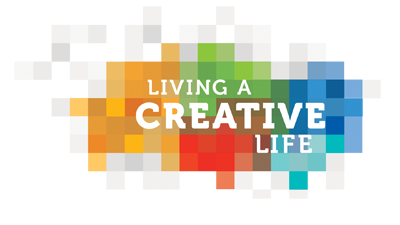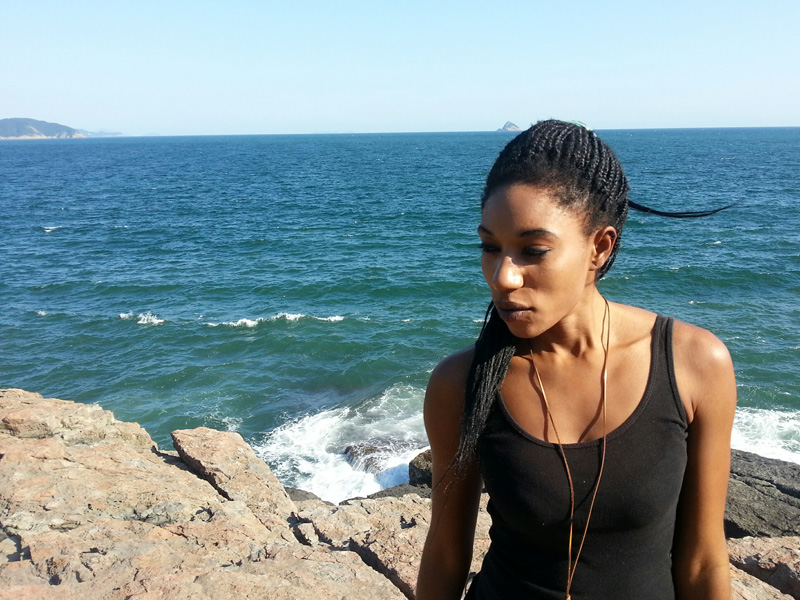Ami Kenzo
Step by creative step, storytelling helps carve out an identity
As a child, Calgarian Ami Kenzo’s life resided in two different locations: sometimes Canada and sometimes the Congo, as she bounced between her country of birth, and Canada, where she mostly grew up.
What she remembers best, from those early Congolese days, was the enduring power of a good story, well-told.
“We used to go to the village to visit my grandparents,” she says, “and I grew up with folklore. You sit outside around a campfire, and there’s call and response. Someone calls histoire! And all the kids call back announcer! Which is like ‘story!’ And the kids are like, ‘Announce! Tell the story!’
“Those kinds of things really stuck with me,” she says, “and I’ve always wanted to reproduce that in some way [in my everyday Calgary life]—the visuals it created in my mind.”
Now, in her thirties, Kenzo is living a very creative life, working with various Calgary arts organizations on projects ranging from documentary filmmaking to newspaper reporting for Our Legacy Newspaper, to working as a board secretary at Antyx Community Arts. She is also co-curating (with Amanda Foote) the film portion of Femme Wave, the city’s feminist cultural festival, and her most recent gig is working as an assistant director on Race Anonymous, an experimental project in empathy created by Calgary director and writer Melanee Murray-Hunt (full disclosure: my wife).
Oh, and then there was the two-year hiatus teaching English in South Korea, where Kenzo discovered just how universal storytelling is.
Step by creative step, Kenzo uses creativity as a way to help carve out an identity as an Afro-Canadian woman who’s a little bit awkward—and could never find a media role model growing up.
“The black woman that’s portrayed in mainstream media,” she says, “I’ve never fit into that character. She’s really cool and composed and witty and neat and has comebacks and they’re clever and can be turned into memes. I was dorky and awkward—there’s no black nerd girls in mainstream media. They’re starting to get really popular [in shows like Issa Rae’s Adventures of an Awkward Black Girl. She now has an HBO series called Insecure]… they finally started to tap into the awkward black girl who wouldn’t make the cool, bitchy sidekick.
“I’m trying my best,” she adds, “with all the volunteer work I’m doing, and trying to surround myself with creative individuals that can encourage and inspire me.”
She discovered quite a few inspiring creative Calgarians while doing interviews for a mini-documentary about feminism from the perspective of women of colour being produced by AfroX Media.
Kenzo interviewed, among others, Professor Maki Motapanyane, who teaches women’s studies at Mount Royal University, Pastor Dee Adekugbe (from Calgary World Harvest), Calgary-Nigerian filmmaker Phina Brooks, and Calgary playwright and University of Calgary professor Cheryl Foggo.
While Kenzo took inspiration and guidance from each woman she spoke with, the one surprise she found herself running into again and again during her research was the reluctance of many women to describe themselves as a feminist—until she spoke to Motapanyane and Foggo.
“Cheryl Foggo embraced the term,” Kenzo says of the playwright whose most recent drama is Remembering John Ware, a memory play about her experiences discovering the story of Alberta icon Ware, an ex-slave who became an iconic Alberta cowboy, and his wife. “I asked her a lot about the early [Alberta] pioneers, focusing on their experiences. And I asked about her own experiences. She was quite candid [about her experiences growing up in Calgary in the 1960s].”
Getting up close and personal with those women—each of whom shared their own stories—helped Kenzo better understand her own unique blend of cultural references, which include Ingmar Bergman movies (she loved Persona), the films of Polish/French director Agnes Varda—and snippets of scenes from the Congo.
“I even got a little personal [with them],” Kenzo says, “talking about how—as an African woman from a very strong African cultural background—how I’m expected to express myself and navigate as a black woman. There’s this pressure from our African communities and society in general, and I find I don’t really fit.”
That’s part of her story. Another part involved that two-year long stint teaching English in Korea.
There, she traded her young Korean English students stories about her life for impromptu tutorials about South Korean pop culture, which in recent years has gone global.
“The 12-year-olds I was teaching would teach me about their gods and kingdoms,” Kenzo says, “because I made each class a cultural exchange. I also learned a lot about K Pop. I drifted to [Korean singing star] G-Dragon right along with the Korean high school girls.
“And everything in South Korea is so colourful. They have a culture that’s very similar to African culture in a lot of ways—it’s very family-oriented, and very community-based—South Koreans do a lot of stuff together. They go out and eat and drink together—which is similar to my culture.”
It has taken years, and many conversations, with many different kinds of people, but Kenzo has been dipping her toe more than ever into sharing some of those stories. She’s dabbled over the years at film, painting, photography and writing, and recently published a story in Our Legacy, a newspaper that focuses on the city’s black community.
What it represented for Kenzo was a big step into sharing her creative life with others.
“That was a huge feat for me,” she says, “because I have a thing about writing and showing people what I did.”
“I had issues editing it,” she adds, “because it was really hard to condense people’s words—but I’m really quite proud. And that’s what gave me more confidence. I can slowly start putting myself and my words out there without worrying so much about my own internal critic and others. I just have to kind of feel the fear and do it anyway.”
With creative outlets such as AfroXMedia, Antyx Community Arts, Our Legacy, Femme Wave, and Race Anonymous, Kenzo is telling more than just her story: she’s helping write a new chapter for the story of Calgary.
Even if the route to getting there was awkward, Kenzo definitely has the right name. “I’m really fascinated with people,” she says. “In African culture—and I’m pretty sure in a lot of different cultures around the world—naming is extremely important. They named me Ami, and I live up to that—that’s my name. Friend. I have a friendly personality.”
She has the right name for the job—which as storytellers everywhere know, is no small deal.
About The Storytelling Project
 On November 16, 2015, Calgary Arts Development hosted a working session with approximately 30 creative Calgarians from various walks of life. Many of the small working groups voiced the need to gather and share more stories of people living creative lives.
On November 16, 2015, Calgary Arts Development hosted a working session with approximately 30 creative Calgarians from various walks of life. Many of the small working groups voiced the need to gather and share more stories of people living creative lives.
That need has turned into The Storytelling Project.
The Storytelling Project raises awareness about Calgarians who, by living creative lives, are making Calgary a better city, effecting positive change and enriching others’ lives.
Have a story to share? Email us at news@calgaryartsdevelopment.com.
